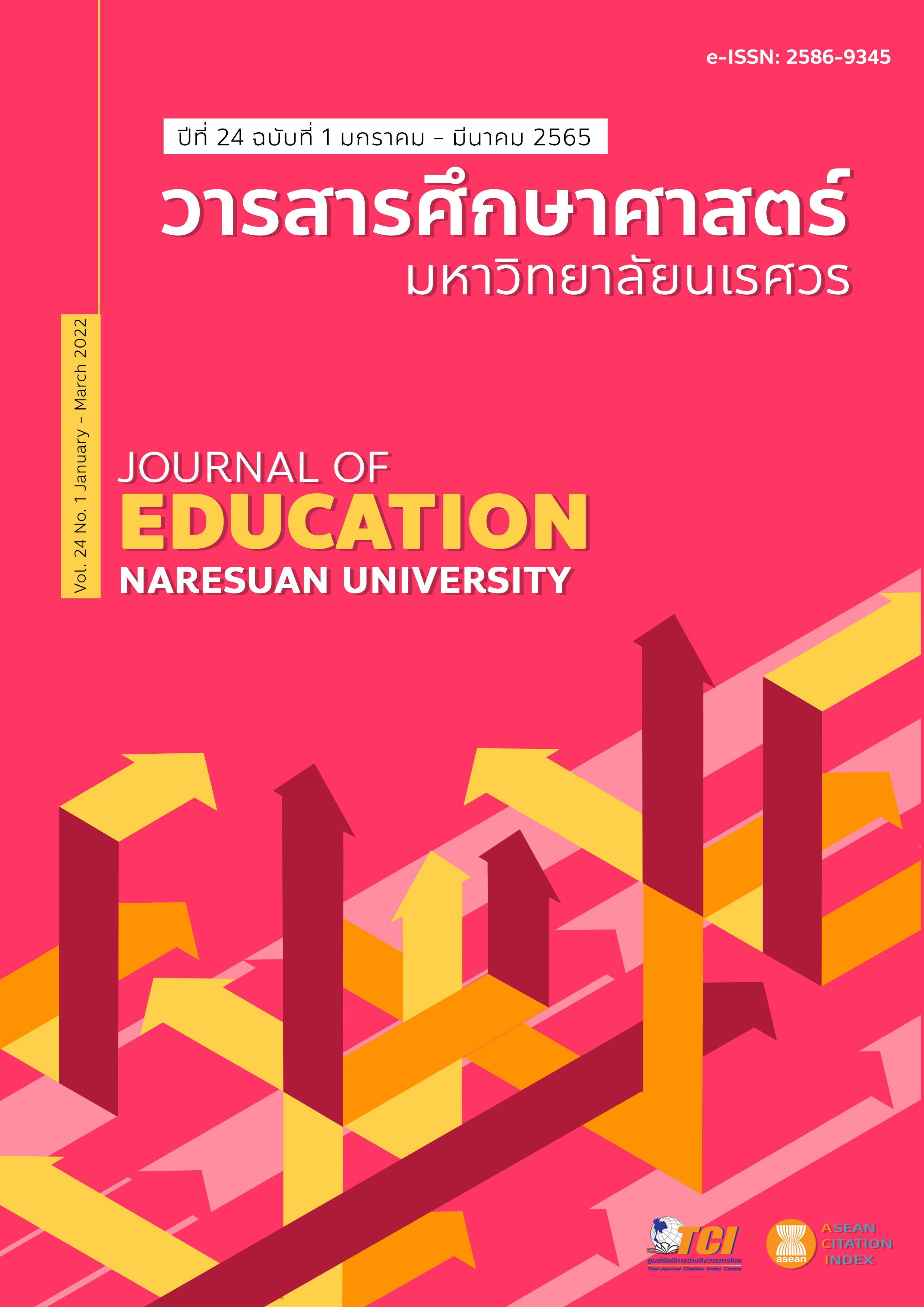EFFECTS OF RESEARCH-BASED LEARNING IN ELECTRICITY AND ENERGY COURSE ON SCIENCE PROCESS OF SCIENCE STUDENT TEACHERS ผลการจัดการเรียนรู้โดยใช้วิจัยเป็นฐานในรายวิชาไฟฟ้าและพลังงาน ที่มีต่อกระบวนการทางวิทยาศาสตร์ของนักศึกษาครูวิทยาศาสตร์
Main Article Content
Abstract
This research aim to design a research-based learning activities in electricity and energy courses for science student teachers and to study the effects of using research-based learning activities on science processes of science student teachers. Mixed method research design was carried out. Research sample is the 44 undergraduate science student teacher from Faculty of Education, selected by cluster sampling. The finding is that research-based learning activities which was designed and constructed consist of 6 steps: 1) survey and observation, 2) questioning/problem definition, 3) constructing hypotheses and experimental design, 4) testing of hypothesis, 5) data analysis and conclusion, and 6) research presentation. This instructional process was allowed for 12 weeks. The designed activity was approved suitability at very good quality level ( = 4.74, S.D. = 0.36). The result of intervention revealed that students were able to learn through science processes at good to very good quality (
= 2.9 – 3.3). The qualitative analysis indicated that the students were enhanced to practice science process skills in many aspects, especially observation skills, constructing hypothesis skills, organizing data and communicating skill, experimental skill, and interpreting data and conclusion skills. In addition, students also reflected the positive opinions on this research-based learning activities.
Article Details

This work is licensed under a Creative Commons Attribution-NonCommercial-NoDerivatives 4.0 International License.
The owner of the article does not copy or violate any of its copyright. If any copyright infringement occurs or prosecution, in any case, the Editorial Board is not involved in all the rights to the owner of the article to be performed.
References
American Association for the Advancement of Science (AAAS). (1967). Science – A process approach. Washington, DC: AAAS.
Bell, S. (2010). Project-based learning for the 21st century: skills for the future. The Clearing House: A Journal of Educational Strategies, 83(2), 39-43.
Bluhm, W. J. (1979). The effect of science process skill instruction on preservice elementary teachers' knowledge of, ability to use, ability to sequence science process skills. Journal of Research in Science Teaching, 16(5), 427-432.
Bybee, R. W., Taylor, J. A., Gardne, A., Scotter, P. V., Powell, J. C., Westbrook, A., & et al. (2006). The BSCS 5E instructional model: Origin and effectiveness. Colorado Spring: BSCS.
Chaidech, T., Chanunan, S., & Chaiyasit, W. C. (2016). Development of collaborative problem solving competency using research-based learning according to STEM education in fossil fuels and products. Journal of Research Unit on Science, Technology and Environment for Learning, 8(1), 51-66. [in Thai]
Chamrat, S., Yutakom, N., & Chaiso, P. (2009). Grade 10 science students's understanding of the nature of science. KKU Research Journal, 14(4), 360-374. [in Thai]
Chanchaichana, S., & Saeng-Xuto, V. (2018). Effect of instruction with science shows to promote science process skills of prathomsuksa 6 students. Journal of Education Naresuan University, 20(4), 219-229. [in Thai]
Faikhamta, C. (2016). PSMT pre-service science teachers’ understandings of nature of science. Journal of Education, Prince of Songkla University, Pattani Campus, 27(2), 21-37. [in Thai]
Hsieh, S. I., Hsu, L. L., & Huang, T. H. (2016). The effect of integrating constructivist and evidence-based practice on baccalaureate nursing student's cognitive load and learning performance in a research course. Nurse Education Today, 42 (Supplement C), 1-8.
Howes, E. V. (2008). Educative experiences and early childhood science education: A Deweyan perspective on learning to observe. Teaching and Teacher Education, 24(3), 536-549.
Ittichinnapat, J. Piromjitpong, S., & Sawadthaisong, N. (2016). The research-based learning model into development preferable numerical analysis skills, communication and information technology skills faculty of bachelor’s degree for Rajabhat Institute Instructors. NRRU Community Research Journal, 10(3), 142-153.
Johnson, N., List-Ivankovic, J., Eboh, W. O., Ireland, J., Adams, D., Mowatt, E., & Martindale, S. (2010). Research and evidence based practice: Using a blended approach to teaching and learning in undergraduate nurse education. Nurse Education in Practice, 10(1), 43-47.
Johnson, R. B., Onwuegbuzie, A. J., & Turner, L. A. (2007). Toward a definition of mixed methods research. Journal of Mixed Methods Research, 1(2), 112-133.
Kijkuakul, S. (2015). STEM Education. Journal of Education Naresuan University, 17(2), 201-207. [in Thai]
Kijkuakul, S. (2018). Qualitative research: A distinguished paradigm and misconceptions. Journal of Education Naresuan University, 20(1), 272-283. [in Thai]
Koocharoenpisal, N., Butnian, N., Jaroensiri, N., & Somjaroen, W. (2016). The effect of utilizing the problem-based learning activity packages on pollution for lower secondary students. Journal of Education Naresuan University, 18(4), 40-55. [in Thai]
Prasertsan, S. (2012). Research-based learning: A new learning paradigm of thailand education. Bangkok: The Thailand Research Fund. [in Thai]
Schoonenboom, J., & Johnson, R. B. (2017). How to construct a mixed methods research design. KZfSS Kölner Zeitschrift für Soziologie und Sozialpsycho logie, 69(2), 107-131.
Tomasik, J. H., Cottone, K. E., Heethuis, M. T., & Mueller, A. (2013). Development and preliminary impacts of the implementation of an authentic research-based experiment in general chemistry. Journal of Chemical Education, 90, 1155–1161.
Tomasik, J. H., LeCaptain, D., Murphy, S., Martin, M., Knight, R. M., Harke, M. A., Burke, R., Beck, K., & Acevedo-Polakovich, I. D. (2014). Island explorations: Discovering effects of environmental research-based lab activities on analytical chemistry students. Journal of Chemical Education, 91(11), 1887-1894. https://doi.org/10.1021/ed5000313
Wilke, R. R., & Straits, W. J. (2005). Practical advice for teaching inquiry-based science process skills in the biological science. The American Biology Teacher, 67(9), 534-540.
Wilson, K. J., & Rigakos, B. (2016). Scientific process flowchart assessment (SPFA): A method for evaluating changes in understanding and visualization of the scientific process in a multidisciplinary student population. CBE-Life Sciences Education, 15(4), 1-14.
Winkelmann, K., Baloga, M., Marcinkowski, T., Giannoulis, C., Anquandah, G., & Cohen, P. (2015). Improving students’ inquiry skills and self-efficacy through research-inspired modules in the general chemistry laboratory. Journal of Chemical Education, 92, 247–255.


